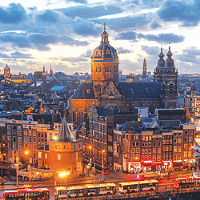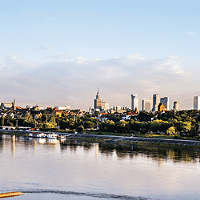When we think about the successful cities of the late 20th century, the growth of the service sector, and finance in particular, is the main story. Although finance is often the most lucrative contribution to a city’s economy, other sectors are more important to job creation.
Wealth may have been created by finance industries, but tech is often growing faster and is more important for job creation in European cities
.png)
FIGURE 4Workplace based employment
In over half of our European cities (London, Paris, Madrid, Berlin, Milan, Amsterdam and Stockholm), information and communication sector jobs are at least as important as 'finance' in job creation and often considerably more so. This data driven sector is evolving rapidly as it includes important new tech jobs.
‘Information and communication’ in Madrid and Paris is more likely to mean larger engineering concerns like telecoms than small innovative start-up and scale-up tech. We would categorise this as ‘big tech’ rather than ‘creative tech’, more likely to involve R&D and manufacturing in less central or out-of-town locations or designated parts of the city rather than in the urban centre – although there are urban ‘creative tech’ quarters, like Malasaña or Pigalle, in both cities. Either way, a significant proportion of the cities’ employees are in this sector.
Dublin is an interesting exception among the cities that we have looked at. It has a huge reputation for being a tech city (it ranks 12th globally in our Savills Tech Cities ranking) and has managed to attract some very big and globally renowned tech companies. However, this activity does not seem to have created so many jobs in the information and communication sector as this reputation might suggest. Dublin has more workers in its finance and insurance sector, revealing the role of Dublin as a global regional tech administration, legal and finance centre rather than a tech innovation hub.
Moscow, Warsaw, Frankfurt, Milan and Brussels have fewer tech sector jobs than finance related jobs, reflecting their strong regional positions servicing local business and investors. Brussels’ finance and insurance sector is closely related to the EU organisations in the city, Milan to the design and fashion industries. Moscow services the whole of the Russian Federation while Frankfurt and Warsaw’s financial hinterland extends over Europe as a whole and Eastern Europe respectively.
.png)
FIGURE 5Economy size and worker productivity in finance and tech sectors
Source: Oxford Economics, Savills World Research









